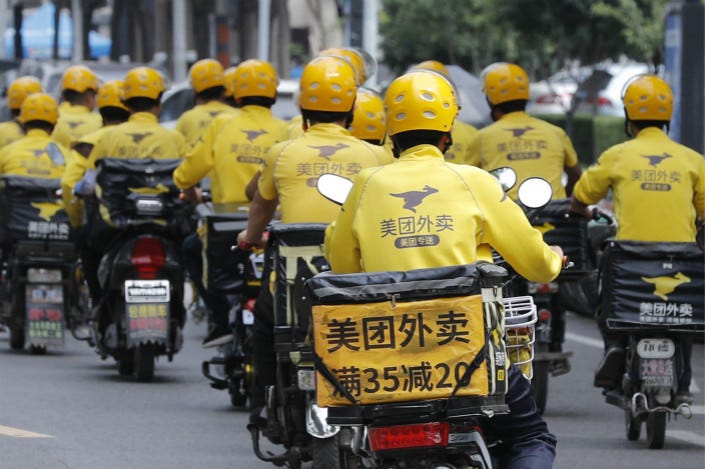Welcome to East West Hurricane! 🌪
We update you on the most essential news from Asia in tech, media, and business—the things you need to know that you probably haven’t heard in Western media.
Follow us on Twitter and Instagram! ⚡️
New Chinese Report Fuels Controversy Around Delivery Drivers 🏍
Last week, an investigative report on the conditions of food delivery drivers went viral in China. The report outlined the working conditions of drivers for food delivery companies like Meituan and Eleme. Drivers are required to deliver food within a certain time frame, and otherwise will have their pay cut by failing to meet that standard. Drivers are often overworked, easily penalised for delays out of their control, and have to deal with hazardous job conditions.

In response to this report, Meituan and Eleme announced new flexibility around drivers’ delivery time and pledged to review driver conditions. The PR fallout won’t be easy to fix, however. We live in a world where the gig economy has created all new types of issues around modern working conditions, both in the East and West. Last month, a court in California blocked an order to enforce a new law AB5, which would require ride sharing companies like Uber and Lyft to classify drivers as employees rather than independent contractors. These two companies were granted a temporary stay to submit appeals, but there’s still a chance AB5 will be enforced and both companies have publicly considered shutting down their services in California. While AB5 doesn’t exist in China, I’m sure that both Meituan and Eleme are keeping an eye on the precarious relationship between their companies and their ‘gig worker’ delivery drivers.
A Profile of SEA Group - Singapore’s First Unicorn 🦄
This KrAsia article profiles the story of the founding of Sea Group, the Singaporean tech company now worth $65 Billion. Sea owns Garena (the biggest gaming publisher in Southeast Asia), Shopee (the biggest e-commerce company in Southeast Asia), and Sea Money, a digital payments platform. Sea has been a publicly traded company since 2017 and has been one of the world’s best performing stocks over the last year, significantly outperforming even the most hyped companies like Tesla.

I have a few observations from this article. All of the three Singaporean founders are originally from China, and you can see the influence of Chinese tech in their company. Their first success was in the gaming industry through Garena, and their game Free Fire is still the highest grossing mobile game in Southeast Asia and Latin America. They used the profits from Garena to launch SeaMoney and Shopee, which was basically inspired as a Southeast Asian version of China’s Taobao. I admire the ambition to branch out into three different, large tech companies, and I don’t see that level of tech diversification apart from companies like Tencent and Alibaba. Another learning, Garena didn’t necessarily reinvent the wheel with their products. My impression of their story is as triumph of execution rather than innovation. And it’s incredibly impressive.
Telegram Becomes Go-To App for Pirated Content in India 😲
Telegram is a popular private messaging app that provides end-to-end encryption for people chatting and interacting with each other securely. For a while, Telegram was infamously known as the company that raised over $1 Billion worth of cryptocurrency in an initial coin offering (ICO). Today in India, Telegram has become well known as a platform for sharing pirated content like films, TV series, and games. Some of the most popular Indian media properties have been frustrated by piracy on Telegram, and a Hindi newspaper even filed charges against Telegram when it discovered PDFs of the newspaper were being distributed on the platform. By 2022, it’s expected that OTT players will lose $3 Billion in revenue from India due to piracy.

Pirating content is a behaviour that happens all over the world, but in India’s fast-growing, huge economy, the country is on track to potentially become the world’s biggest consumer of pirated entertainment. Telegram has 40 Million users in India and is the largest single market for the messaging app. Technology will never be able to completely prevent piracy, but the Telegram situation outlines an interesting tradeoff of privacy with piracy. The more secure a messaging app, the easier it is to share pirated content. Telegram also benefits from laws around the legal provision ‘Safe Harbour.’ Like Youtube and other digital platforms, Telegram itself isn’t directly responsible or legally liable for illegal content since they are an ‘intermediary’ and don’t create the content themselves. So this will remain a problem for India’s entertainment industry.















Share this post